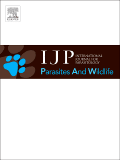
International Journal for Parasitology-Parasites and Wildlife
metrics 2024
Innovating Solutions for Wildlife Conservation and Disease Mitigation
Introduction
The International Journal for Parasitology-Parasites and Wildlife, published by ELSEVIER, is a premier open-access journal dedicated to advancing the field of parasitology and wildlife research. Established in 2012, this influential journal has garnered a reputation for excellence, as evidenced by its impressive rankings, including Q1 in Animal Science and Zoology and Q2 in both Infectious Diseases and Parasitology as of 2023. With an ISSN of 2213-2244, this journal serves as a critical platform for researchers, professionals, and students, fostering a deeper understanding of parasite-host interactions and their ecological impacts. The journal encourages innovative studies that contribute to the mitigation of infectious diseases and enhance wildlife conservation efforts. With a commitment to open access, the International Journal for Parasitology-Parasites and Wildlife ensures that cutting-edge research is easily accessible to the global scientific community, helping to bridge gaps in knowledge and stimulate further inquiry.
Metrics 2024
 0.61
0.61 2.00
2.00 2.10
2.10 41
41Metrics History
Rank 2024
Scopus
IF (Web Of Science)
JCI (Web Of Science)
Quartile History
Similar Journals
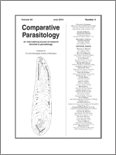
Comparative Parasitology
Bridging Ecology and Evolution in Parasitic StudiesComparative Parasitology, published by the Helminthological Society of Washington, serves as a vital platform for the dissemination of innovative research in the fields of parasitology, ecology, and evolution. With an ISSN of 1525-2647 and an E-ISSN of 1938-2952, this journal has charted a course of academic influence since its inception in 1996, and is set to continue until 2024. Although it currently holds a Q4 ranking in both Ecology, Evolution, Behavior and Systematics and Parasitology categories, it guarantees significant contributions and diverse studies, providing an essential resource for researchers and practitioners in these domains. Located in the United States and managed by Allen Press Inc, Comparative Parasitology emphasizes open access, ensuring that vital research findings are readily available to the global community. The journal remains dedicated to fostering an understanding of the complexities of host-parasite interactions and promoting interdisciplinary collaboration, making it a crucial resource for students and professionals alike.

FOLIA PARASITOLOGICA
Unveiling the Complexities of Parasitic Interactions.FOLIA PARASITOLOGICA is a distinguished scholarly journal published in the Czech Republic, focusing on the field of parasitology. With a commitment to advancing knowledge in parasitology, the journal covers a wide array of topics including the biology and control of parasites, host-parasite interactions, and epidemiology. Having been in circulation since 1971 and currently converging its years of research until 2024, FOLIA PARASITOLOGICA has established itself as a vital resource for researchers, professionals, and students in immunology and microbiology, currently ranked in the Q3 category for Parasitology. Although it does not operate under an open-access model, the journal's relevance is underscored by its Scopus ranking, where it is positioned 47th out of 79 in the field, reflecting the high standards of research it publishes. By hosting a range of studies and reviews, FOLIA PARASITOLOGICA continues to contribute significantly to the scientific community, fostering advancements that enhance our understanding and management of parasitic diseases.

Journal of Fish and Wildlife Management
Championing research that shapes conservation policy.The Journal of Fish and Wildlife Management, published by the U.S. Fish & Wildlife Service, serves as a vital resource for scholars, researchers, and professionals in the fields of Animal Science, Ecology, and Conservation Biology. With its ISSN 1944-687X, this esteemed journal has been disseminating critical research findings since 2010, contributing significantly to the understanding of fish and wildlife conservation practices and their ecological impacts. Despite its Q3 category rankings in various disciplines as of 2023, it provides a platform for innovative research that influences policy and management strategies for biodiversity conservation. The journal, although not open access, remains committed to advancing the scientific discourse surrounding wildlife management with articles that emphasize practical conservation efforts and ecological sustainability. Readers can expect a diverse range of articles that promote best practices in the management and conservation of fish and wildlife resources, furthering our collective mission of preserving ecological health and biodiversity for future generations.
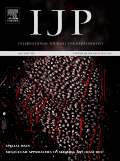
INTERNATIONAL JOURNAL FOR PARASITOLOGY
Fostering Academic Excellence in Parasitology StudiesInternational Journal for Parasitology, published by Elsevier Sci Ltd, stands as a premier platform for disseminating groundbreaking research in the fields of parasitology and infectious diseases. With an impressive impact factor represented by its Q1 quartile rankings in both Infectious Diseases and Parasitology for 2023, this journal commands significant attention within the scientific community. Operating since 1971, it has profoundly contributed to the understanding of parasitic infections and their implications for human health, occupying a distinguished position ranked #7 out of 79 in Parasitology and #64 out of 344 in Infectious Diseases according to Scopus metrics. Although the journal currently does not offer open access options, it ensures rigorous peer review and unparalleled academic integrity, providing researchers, professionals, and students with critical insights necessary for advancing knowledge and fostering innovations in parasitology. Together with its rich historical foundation and commitment to excellence, the journal is indispensable for anyone delving into the complexities of parasites and their impact on both host and ecosystem.

Human-Wildlife Interactions
Exploring the Complex Tapestry of Human-Wildlife Relationships.Human-Wildlife Interactions, published by the JACK H BERRYMAN INST, is a leading open-access journal dedicated to the critical study and understanding of the complex relationships between humans and wildlife. Launched in 2007, the journal has become a pivotal platform for researchers, practitioners, and students in the fields of ecology and conservation. It is based in the heart of ecological research at Utah State University, bringing together diverse perspectives that illuminate both the challenges and solutions associated with wildlife interactions. With an impact factor reflected in its respectable Q3 ranking in Ecology and Nature and Landscape Conservation, it demonstrates a solid contribution to these scientific domains. Researchers exploring innovative conservation strategies, wildlife management practices, and the socio-economic impacts of wildlife are encouraged to submit their studies, enhancing the journal's role in fostering dialogue and advancing knowledge in this vital area of environmental science. Accessible to a global audience, Human-Wildlife Interactions continues to promote scholarly discourse in a way that supports the sustainable coexistence of people and wildlife in our shared environments.
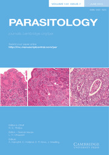
PARASITOLOGY
Unveiling the complexities of host-parasite dynamics.PARASITOLOGY, published by Cambridge University Press, is a prestigious journal that has been at the forefront of research in the field of parasitology since its inception in 1908. This esteemed publication carries the ISSN 0031-1820 and E-ISSN 1469-8161, and its rigorous peer-reviewed articles provide insights into both fundamental and applied aspects of parasitic biology, infectious diseases, and host-parasite interactions. With a commendable impact factor, PARASITOLOGY ranks in the top quartile (Q1) for Animal Science and Zoology and holds Q2 rankings in both Infectious Diseases and Parasitology categories, indicating its significant influence and contribution to these disciplines. The journal's diverse scope allows for a broad range of research articles, reviews, and case studies, making it an essential resource for researchers, professionals, and students seeking to stay updated on the latest developments in the field. Based in the United Kingdom, PARASITOLOGY offers valuable access to critical research in an era where understanding parasitic diseases is more vital than ever, and continues to shape the future of this important scientific field.

Revista Agrogeoambiental
Exploring Agroecological Systems for Sustainable DevelopmentRevista Agrogeoambiental is a prestigious open-access academic journal dedicated to the field of agricultural and environmental sciences. Published by INST FEDERAL SUL MINAS GERAIS-I FSULDEMINAS since 2009, this journal stands as a vital forum for the dissemination of research findings, innovative methodologies, and interdisciplinary studies that address critical issues in agriculture and environmental sustainability. With a focus on promoting knowledge exchange among researchers, practitioners, and educators, Revista Agrogeoambiental seeks to enhance understanding of agroecological systems and their interaction with geospatial frameworks. As an open-access journal, it ensures that cutting-edge research is accessible to a wide audience, thereby fostering collaboration and knowledge-sharing in the global academic community. Researchers and professionals can benefit from the journal's commitment to high standards of scholarship, as well as its role in shaping policy and practice within the agricultural and environmental sectors.

KOREAN JOURNAL OF PARASITOLOGY
Bridging Knowledge Gaps in ParasitologyKorean Journal of Parasitology is a respected publication in the field of parasitology, originating from the esteemed Korean Society of Parasitology and affiliated with Seoul National University College of Medicine. Established in 1977, this journal focuses on disseminating significant research findings related to parasitic diseases, their vectors, and control measures, serving as a vital resource for researchers, medical professionals, and students alike. Although coverage in Scopus has been discontinued as of 2022, the journal remains a valuable platform for in-depth studies within the areas of Infectious Diseases and Immunology. With an ISSN of 0023-4001 and an E-ISSN of 1738-0006, the journal promotes open access to enhance academic sharing. Despite its current Scopus rankings, which place it in the 38th percentile for Infectious Diseases and 37th percentile for Immunology and Microbiology (Parasitology), it continues to contribute to the global discourse on parasitological research, encouraging collaboration and emphasizing the importance of this field in public health.
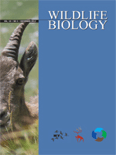
WILDLIFE BIOLOGY
Advancing knowledge in wildlife conservation and ecology.WILDLIFE BIOLOGY is a prestigious open-access journal published by WILEY, dedicated to the dissemination of high-quality research in the fields of ecology, evolution, behavior, and conservation. With an impressive Impact Factor indicative of its scholarly relevance, the journal has been a cornerstone for researchers since its inception in 1995, now extending its convergence through 2024. Recognized within the top Q1 and Q2 quartiles across various categories—including Ecology, Evolution, Behavior and Systematics and Management, Monitoring, Policy and Law—this journal plays a crucial role in fostering knowledge and promoting effective solutions in wildlife biology. The journal serves a diverse audience, offering robust access options since 2014, ensuring that vital research is freely available to professionals, researchers, and students alike. With its base in Denmark, the journal encourages contributions that address pressing wildlife management issues and informs policy development, further cementing its significance in the ecological research community.
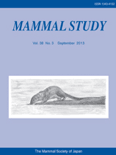
MAMMAL STUDY
Championing conservation through impactful mammalogy studies.Mammal Study, published by the Mammalogical Society of Japan, is a leading academic journal dedicated to the field of mammalogy and related biological sciences. Since its inception, it has provided a critical platform for researchers, professionals, and students to share their findings and insights into the diverse facets of mammalian biology, ecology, and conservation. The journal, with ISSN 1343-4152 and E-ISSN 1348-6160, is recognized for its rigorous peer-review process and has attained a commendable Q3 ranking in the 2023 category of Animal Science and Zoology. With an impact factor reflecting its growing influence—ranking 283 out of 490 in Scopus—we welcome contributions that advance the understanding of mammalian species and their habitats. While access to published articles is through traditional channels, the journal aims to reach an even wider audience by fostering greater awareness and appreciation for mammalian research and conservation efforts. The Mammal Study has converged years of insightful publications from 2008 to 2024, solidifying its position as a vital resource in the biological sciences.